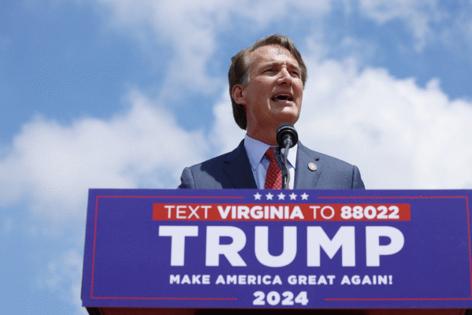Supreme Court OKs Virginia GOP's last-minute bid to purge alleged noncitizens from voter rolls
Published in Political News
A divided Supreme Court on Wednesday ruled for Virginia Republicans, clearing the way for an election-eve purge of about 1,600 registered voters who were suspected of being noncitizens.
Over three dissents, the court granted an emergency appeal from Virginia's attorney general and set aside rulings by a federal judge who called the last-minute purge a "clear violation" of federal law.
The justices did not explain their views. The majority consisted entirely of Republican appointees.
The three Democratic appointees — Justices Sonia Sotomayor, Elena Kagan and Ketanji Brown Jackson — said they voted to turn down the state's appeal.
The decision is not likely to affect any races in Virginia, but it showed the court's conservatives are ready and willing to act on late-breaking appeals from Republicans.
They are due to rule later this week in a Pennsylvania case that could affect several thousand voters who mailed in ballots with errors on the envelope.
Last week, the Pennsylvania Supreme Court ruled that voters who made a mistake, such as failing to sign the envelope, could go to their polling place on election day and cast a provisional ballot that would be counted.
On Monday, the Republican National Committee filed an emergency appeal asking the Supreme Court to throw out the lower court's ruling in the Pennsylvania case and hold that the voters in question had lost their right to cast a ballot.
The Virginia case involved the state's belated effort to remove noncitizens from the voting rolls.
Virginia Gov. Glenn Youngkin, a Republican, called Wednesday's decision "a victory for common sense and election fairness. Virginians can cast their ballots on election day knowing that Virginia's elections are fair, secure, and free from politically motivated interference."
The Harris-Walz campaign said in a statement that "every eligible voter has a right to cast their ballot and have their vote counted, and this ruling does not change that. Voting by noncitizens remains illegal under federal law."
The Democratic campaign noted that Virginia has same-day registration so that "anyone improperly kicked off the voter rolls can reregister and vote that day."
At issue in the legal dispute was not whether states may remove noncitizens from their voting rolls, but when they may do it.
Federal law says states may not "systematically remove" registered voters from the rolls in the 90 days prior to a federal election. Congress, in passing the law, said the danger is that voters will go to the polls on election day and discover they are no longer registered.
In early August, Youngkin issued an order to speed up the process of removing voters from the rolls who were flagged as possible noncitizens in state databases. They included residents or people with the same name who had checked a box when renewing their driver's license that said they were noncitizens.
Shortly after voting rights advocates learned of the order, they discovered about two dozen longtime legal voters who had been wrongly removed from the rolls.
They sued along with the U.S. Justice Department, and a federal judge blocked Youngkin's order on Oct. 18.
U.S. Judge Patricia Giles said the state's data-based program is a "clear violation" of the National Voter Registration Act of 1993, and she ordered the state to restore the affected voters to the rolls. She noted, however, the state may cancel the registration of individuals who are shown to be noncitizens or otherwise ineligible.
In a 3-0 decision, the 4th Circuit Court refused to lift the judge's order on Oct. 27.
Virginia's state attorneys filed a fast-track appeal with the high court an appeal with the high court on Monday, arguing the federal law that forbids election-eve purges "does not even apply to the removal of noncitizens. ... This election-eve injunction is thus based on legal error."
Virginia Atty. Gen. Jason Miyares, a Republican, said it would violate "common sense" and "irreparably injure Virginia's sovereignty" to keep noncitizens on the voting rolls.
U.S. Solicitor Gen. Elizabeth Prelogar had urged the court to deny the appeal. She said the state clearly violated a federal law "enacted to prevent the very type of 11th-hour disenfranchisement and confusion that (state officials) have caused here. "
_____
©2024 Los Angeles Times. Visit latimes.com. Distributed by Tribune Content Agency, LLC.




























































Comments